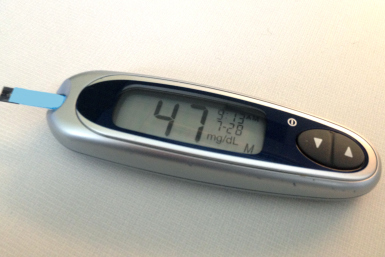By Sean Kelley, Cooking Light contributor
When my friend and #SocialDiet compatriot Scott Mowbray wrote about solving for X to lose weight, he's talking about the math required to take off pounds. Simple algebra: Calories consumed minus calories burned = X, where X is the caloric difference. If it's a negative, you lose weight.
This formula is actually what most weight-loss advice is based on. Sure, you need support, the right environment, inspiration and dedication. But to really remove the pounds, you gotta burn more than you eat.
If solving for X is simple algebra for a normal overweight person, solving for X is quantum physics for someone on an insulin pump. And I'm learning quantum physics on the fly.
I have had diabetes for nearly 15 years. I have a version of the disease often called Type 1.5 (latent autoimmune diabetes of adults). It started out as classic Type 2 diabetes -- even though I was athletic and of normal weight. Over the years I've progressed to the point where I take insulin for every meal. (I will always take insulin -- this is not a disease you can put into remission. But my old pancreas is probably still pumping a little insulin out. Losing weight and eating healthier could reduce the amount of insulin I'm taking.)
Last year I got an insulin pump, which allows me to inject doses when I eat. The pump also injects insulin at a particular rate over the course of the day. It has taken me nearly a year to get the pump and my body in sync. Our bodies, unfortunately, are not computers. They react to stress, to hormonal and emotional changes, to illness -- even to seasonal changes. And that can throw off the carefully calibrated insulin doses doled out by my pump.
Habitual behavior -- eating the same foods and exercising the same way at the same times -- makes managing diabetes (Types 1 or 2) easier. The body gets into a predictable rhythm. But changing rhythm can have substantial challenges.
Since I started my weight-loss effort, these lows are occurring several times a week. Fortunately, I have a lot of experience dealing with the highs and lows of diabetes. And I test my blood sugar levels regularly to head off these problems and recalibrate. Still, it makes losing weight all the more challenging.
But being overweight with diabetes is far worse than dealing with a few hypoglycemic reactions. Whether it's type 1, 1.5 or 2, being overweight can be a killer. It increases our already high risk of heart disease, the top complication of diabetes. It increases the risk of hypertension. And it makes managing diabetes more difficult.
I can deal with my blood sugar going low occasionally. What I don't want to deal with: the complications of diabetes. That's why solving for X has become more important as I've gotten older and my disease has progressed.
What are your unique weight-loss challenges? Share your experiences -- comment here, email letters@CookingLight.com and tweet @Cooking_Light using #SocialDiet.
Note: This post originally appeared on the Cooking Light blog, Simmer & Boil. Check in on their progress at CookingLight.com/WeightLoss.
For more by Cooking Light, click here.


